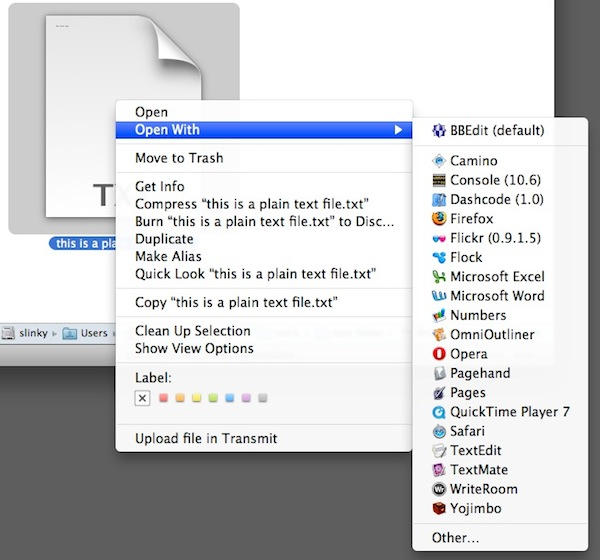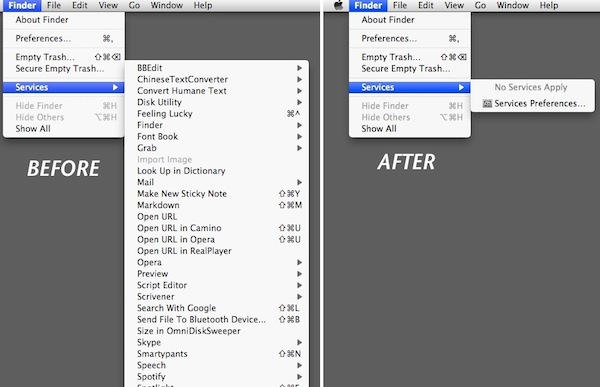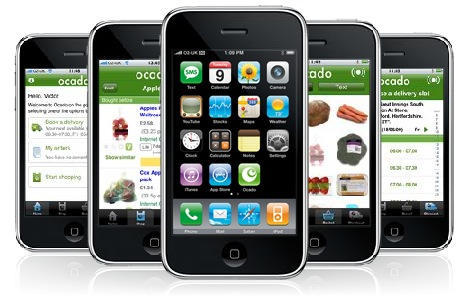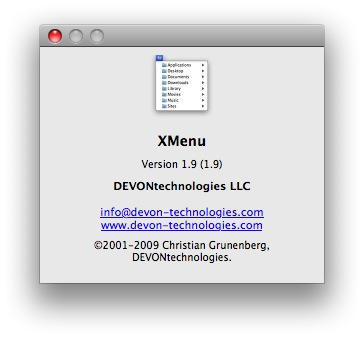So, what’s new in the iPod Nano? Here’s a quick look at some of the most interesting new features…
Apple Event: New iPod Nano Features


So, what’s new in the iPod Nano? Here’s a quick look at some of the most interesting new features…

Apple has introduced a new system for controlling the way files are opened in Snow Leopard, and some users are very upset about it.
“Apple has made a huge, dumb mistake,” says Ross Carter, a developer whose application, Pagehand, is affected by the change.

Snow Leopard’s revitalised Services menu is probably my favorite improvement among the many included in the upgrade.
At long last, the user has been given total control over Services. We can choose whether or not they are used, we can assign keyboard shortcuts that suit us, and we can create entirely new Services using Automator.
The crucial difference between Services in Leopard and Services in Snow Leopard is context.

OK, this one’s a bit niche, but some of you might find it useful. For the benefit who’d rather read than watch a video, here’s an explanation.
Many of you will already be familiar with OS X’s built-in zoom feature (which you can reach via the Mouse or Trackpad prefs in Snow Leopard). Hold down Control (by default; you can change it to Option or Command if you wish), then two-finger scroll up or down on your trackpad, or use a mouse wheel if you have one. Your display will zoom smoothly in and out.
And many of you will also have heard about the new QuickTime screencast recording feature in Snow Leopard, which offers does a fine job but lacks the bells and whistles found in full-scale screencasting apps like ScreenFlow.
Combine the two, and you have a neat way of calling out or highlighting details while using QuickTime to record a screencast.

Now here’s something unexpected. Sophos security consultant Graham Cluley has a warning for everyone who’s just upgraded their computer to run Snow Leopard: go check your Flash plugin version as soon as possible, because you might find that your OS upgrade simultaneously downgraded your plugin. (Assuming your plugin was up-to-date to begin with; full explanation in the video above.)
You can check your plugin version at this page on Adobe’s site.
While the Vimeo Flash video player Graham’s using is not going to cause any harm to your computer, you can’t be certain that Flash content elsewhere on the web will be as safe.
How so? I called Graham this morning and asked him.

Apple, you guys always make me smile! I love you and all your products!
I love surprises too! Those cute little tricks you discover when you’re using Apple stuff! Great!
And I’ve just discovered the best surprise yet!.

Way way back in the mists of ancient history, I owned a Palm device, and I loved the little fella.
One of my favourite apps for the Palm was AvantGo (now defunct) – a huge database of free newspaper and magazine content that the device would download every time you synced the Palm with your desktop computer.
I used to spend long train journeys catching up with news from the BBC, Wired, and a bunch of other publications. Most of it was full text, there were no ads (not that I can remember, anyway – this was a long time ago now), it was fast and quick and easy. Superb.
This week I noticed Time magazine’s new app, and started poking around elsewhere in the news section of the App Store. In particular, I wanted to see what the UK media were up to.

In what’s turning out to be a busy few weeks for the team at Bare Bones, their information manager app Yojimbo has just been bumped up to 2.0. The new version is a 20 dollar upgrade for owners of older versions, is Snow Leopard compatible, and has this spectacular new icon.
OK, so we’ve already established that the iPhone camera is capable of some pretty amazing photography, even if you don’t use one of the many fantastic photography-related apps available on the Store.
One thing I’ve not seen it used for to date has been action shots; but Oregon-based photographer Jared Souney has been putting his 3GS to good use for just that.
I wanted to find out how he did it, so I asked him. Here’s what he said.

Have you heard of Posterous yet? It’s a free hosted blogging service, where the aim is to making the act of posting content as simple as possible.
Which means that posting-by-email is the primary interface. Send Posterous anything in a mail message – text, pictures, video, other files – and it tries to do The Right Thing with whatever it is, to make it work as a post.
And on the whole it works very well. I’ve been playing around with it recently and I’m impressed. I like the simplicity and the immediacy of it.
That might explain why I was excited to see today’s announcement of a Posterous iPhone app.

Another screencast for your information and entertainment. If you want to know more, you can grab a copy of Radio Gaga from here.
And that station playing French pop from the 50s and 60s is Radio Oh-la-la, and if you couldn’t listen to it for free on the web, it’d almost be worth buying Radio Gaga for that alone. Maybe.

Bare Bones, the veteran Mac software company and producer of Yojimbo and BBEdit, has announced some changes to its product roster.
File utility Super Get Info is to be discontinued. There will be no further development, and support for the final release (1.3.1) will cease at the end of this year.
And Mailsmith, the plain-text mail client first released in 1998, is to be made freeware and will no longer be a Bare Bones official product.
Mailsmith’s new home will be at Stickshift software, owned and run by Bare Bones boss Rich Siegel. Who is, we should point out, remaining in charge at Bare Bones; the software remains the same, it’s just the details of who owns it that changes. Rich will now have two hats to distribute software under. (We’ve emailed him some supplementary questions for a little more detail; this post will be updated when we get a reply.) (See after the jump for additional comment.)
What does this mean for Bare Bones’ premium products, BBEdit and Yojimbo? More frequent updates, perhaps? One or two new apps, maybe? We’ll have to wait and see. I’m rather hoping for both.

Here’s a blog after my own heart: Minimal Mac is devoted to keeping your Mac as simple as can be, something I strive to do as far as possible.
A few minutes browsing Minimal Mac shows me I’ve still got a long way to go. I thought my desktop was minimal:
…but it turns out that real purists wouldn’t care for all that junk in the Menu Bar. If you aspire to proper minimalism, you need to have a Menu Bar more like this:

Hey, look what I found: iPhone Photography, a lovely little gallery of artistic, interesting photos made with iPhones.

I asked the site’s creator, Caleb Kimbrough, to explain what it was all about.
Here’s what he said.

Yesterday I posted an interview with NetNewsWire developer Brent Simmons about the addition of advertising to the app.
I’d sent a follow-up question, asking Newsgator’s VP of Marketing about the expected pricing structure; here’s the answer, directly from Brent Simmons himself.
“The switch to in-app ads for NetNewsWire is not to make up for lost revenue from NewsGator Online nor is it about the economy.
“It’s common for consumer products to feature free, ad-supported versions and paid, ad-free versions. For example, Tweetie and Twitterrific — two very popular Twitter clients, as you know — offer free and paid versions. And FeedDemon, our RSS reader for Windows, has had ads for some time.
“This strategy gives people the chance to still use the app for free — while still giving a company a way to make money, which is a good thing. We felt the time was right to do follow this strategy with NetNewsWire. So there will be a free ad-supported version, and soon we will release a paid, ad-free version. (The two will have the same features: the only difference will be the ads.)
“We haven’t finalized pricing yet, but we’re looking at a range of $15 to $20, with special introductory pricing at first.”
So there you have it. Will you pay 15 to 20 bucks to remove ads from NetNewsWire? Your thoughts, as always, are welcomed.

What, you may be wondering, is going on over at Newsgator?
In a recent statement, the company (which owns NetNewsWire, the desktop RSS reader that pretty much defined the category on OS X) announced a fundamental change to its service: from August 31st, it will switch off the web-based RSS reader known as Newsgator Online for consumer users.
Newsgator’s existing desktop apps, including NetNewsWire, will continue to work. But if you want them to sync with other RSS readers, you’ll have to have a Google Account and do it via Google Reader, which will become your web-based viewer, replacing Newsgator Online.
And all this, of course, has consequences for users of NetNewsWire. A new public beta is out now, which supports the Google-based sync.
It also includes ads, distributed via The Deck. This last change has not been trumpeted with quite as much enthusiasm by Newsgator – advertising is not mentioned at all in the blog post that announced the changes.
Cult of Mac got in touch with NetNewsWire’s developer and mastermind, Brent Simmons, to ask him: what’s going on? And why the ads?
Here’s what he said.

Now, if I worked in a proper office with a bunch of other people, this app would probably have pride of place on my iPhone’s dock.
It’s called Tea Round, and it’s a work of genius. You enter the names of everyone in your office, then simply give it a shake every time the decision is made that a cup of tea is called for.
Tea Round decides whose turn it is, and the named individual must go and make the tea. After all, “Tea Round’s decision is final and legally binding.”
You can even have separate tea rounds for work, home, and anywhere else there might be a need for a group of people to have a cup of tea. Right now the app is free, which makes it almost as awesome as tea itself.
Unfortunately I work alone, at home, and it is always my turn to make the tea. That is both a blessing and a curse.

All this Moon landing nostalgia is wonderful and I’m enjoying every minute of it, especially We Choose The Moon and the CAPCOM and EAGLE Twitter accounts — anyway.
If you’ve ever wondered whether you could make it as an astronaut, here’s the ultimate test: Virtual AGC for Mac.

Another little screencast for you, this time about PersonalBrain, a mind-mapping tool. I recently spent some time exploring this app and found it an odd mix of the infuriating and the fascinating.
The screencast I refer to, about the guy with 100,000 items in his PersonalBrain, is here.
Like I say in the video, PersonalBrain doesn’t really appeal to me; but if you use it, I’d be interested to hear what for, and why you like using it.


Everyone’s favorite yummy mummy and sleb chef, Nigella Lawson, has just “succumbed” (as she puts it), and bought herself an iPhone.
To store recipes, perhaps? No.
To take photos of her magnificent meals and upload them to the net? No.
To Twitter her celebrity lifestyle to fellow celeb Twitterers? No.
No, none of these. It turns out that Nigella’s fave app is White Noise, which she uses to lull herself to sleep.

Here’s a neat little iPhone app for all you typography nerds: Typography Manual is a pocket reference book for everything you could wish to remember about fonts and typefaces.
Better still, it’s more than a reference book. It’s a toolbox as well, with a font size calculator, em calculator, conversion tables for switching inches and millimetres into points and picas, and a list of HTML character codes. If none of those things mean a thing to you, don’t buy Typography Manual. But if they do, you might find it hard to resist. It’s only five bucks.
My favorite review is the last one on the testimonials page: “One of only a handful of programs I’ve seen on the iPhone that hyphenate properly.” (And yes, I know I’m using straight quote marks there. I know, I know.)

Here’s a quick follow-up to my last Camino screencast. In this short video, I’ll show you how to get a little more control over your windows and tabs while using Camino.
More screencasts are forthcoming. Got a topic you’d like to see covered? If I know something about them, I’ll be happy to explore your suggested topics. Give me a shout in the comments.

Ocado is one of the UK’s classier supermarkets. It’s online-only (although closely linked to meatspace retailer Waitrose) and most people would probably say it appeals to the better-off kind of shopper.
It’s also, as of this week, a pioneer of iPhone shopping. The free Ocado app does a few clever things that the other big retailers might want to keep a close eye on when they finally get round to building apps of their own.

XMenu from the Devonthink people is one of those freeware apps that I recommend to every Mac user I meet. The latest update, version 1.9, is newly released and boasts visual refinements and a helpful new feature.
For the uninitiated, XMenu is a Menu Bar widget for getting to stuff quickly without leaving the app you’re in. What I like most about it is its flexibility. You can have six different shortcuts in your Menu Bar if you like, or just one if you prefer to keep things simple.
That’s what I do. I use the user-defined widget and throw aliases for useful files and folders into ~/Library/Application Support/XMenu – that way, I keep my Menu Bar uncluttered but XMenu still gives me quick click access to stuff like my todo.txt, my income and expenses records, and a handful of use-them-every-day folders.
If your Dock is overcrowded with folders or stacks that you don’t use because, well, because it’s overcrowded, then you should have a look at XMenu. This latest update adds a text snippets manager that works just the same as the user-defined widgets. Put some plain or rich text files in the right place, and XMenu will let you insert them into any app with two clicks.